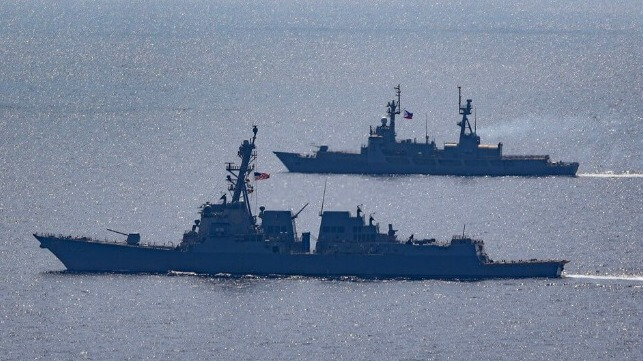Op-Ed: Manila Could Cut a Deal With Trump on S. China Sea's Oil
A “win” for Trump: oil and gas in exchange for little more than what the US Navy is already doing

[By Vincent Kyle Parada]
Donald Trump is making good on his promise of “America First.” After admonishing US allies for failing to pay their “fair share” of defence costs and a now infamous meeting with Volodymyr Zelenskyy, the message was clear: America’s friendship was a privilege, not a right. If US partners wanted to enjoy the privilege of US security, then they must pay up. And right now, Washington is looking to collect.
For the Philippines, this transactional approach to foreign policy casts a shadow over its territorial dispute with China. Despite continued optimism from policy elites, the use of formerly cooperative arrangements as tools of coercion should give Manila pause. While the strategic value of the Philippines as a forward operating base means it continues to enjoy Washington’s good graces, the onus is on the Marcos Jr. administration to continuously reaffirm this value – or risk abandonment in a Trump-polar world.
The Ukrainians understood this when Washington demanded US$500 billion in mineral wealth as compensation for wartime aid. Though negotiations remain inconclusive, the latest drafts point to a potential joint investment deal that would see revenues from Ukrainian natural resources diverted to an investment fund managed by both parties. It would come with neither a security guarantee nor the assurance of additional aid. But Kyiv’s assumption appears to be that by providing the Americans with a clear, tangible stake in the survival of the Ukrainian state, it could ensure continued US support against Russia – especially since at least 50% of its rare earth deposits are in what is presently Russian-occupied territory.
Like Kyiv, Manila needs to provide the United States with “skin in the game” beyond military basing. Reed Bank – a disputed tablemount in the Spratly Islands rich in hydrocarbons – could be the solution. The feature lies well within the Philippines’ exclusive economic zone (EEZ), meaning Manila has sovereign rights to explore and exploit its resources under Article 56 of the UN Convention on the Law of the Sea. According to the US’ own estimates, there could be as much as 9.2 billion barrels of oil and 216 trillion cubic feet of natural gas in unexplored deposits across the South China Sea, with many concentrated along shallower areas such as Reed Bank.
The problem is the limited ability of the Philippines to harness these reserves. It tried roping China and Vietnam into a joint marine seismic undertaking in 2005 – a decision made as much to manage tensions as it was to benefit the economy, and which would later be declared unconstitutional on the grounds that foreign-owned entities could not partake in the exploration, development, and utilisation of natural resources. Manila tried again in 2012, this time without Vietnam, but failed due to Beijing’s refusal to recognise the sovereign rights of the Philippines over the area.
This would not be a problem for Washington. From Obama to Trump 2.0, the US has been the Philippines’ leading supporter in the South China Sea. With an ongoing trade war against Canada and Mexico – two of the US’ biggest sources of crude imports – the Philippines has a chance to step in and help diversify US hydrocarbon streams, generate profits, and keep energy prices stable in the long-term. Manila is already working to cut coal and diversify its energy mix through foreign investments. With the Malampaya gas field – the country’s largest energy producer – nearing depletion, the prospect of joint exploration in the oil-and-gas-rich Reed Bank with an ally rather than competitor might just be enough to overcome domestic apprehensions about the foreign development of resources.
We know that Manila has been trying to lift constitutional limits on foreign ownership – and that US firms have expressed interest in oil and gas projects in the country. At the very least, preferential trade agreements could be negotiated in exchange for technical assistance, or with US entities granted shares in Philippine-owned corporations, or a joint investment fund established that would entitle them to oil and gas revenues.
In the end, it boils down to politics. Legal hurdles aside, Reed Bank remains a contested feature. To exploit its hydrocarbon reserves, Washington and Manila will have to force Beijing out of the area or station a maritime force to safeguard drilling operations. That carries the risk of turning Reed Bank into another flashpoint in the South China Sea.
Here, joint US-Philippine patrols will be key. American ships must be visibly present in order to deter Chinese encroachment. But given Manila’s decision not to physically involve other countries in South China Sea operations, is the Marcos Jr. administration willing to challenge China over Reed Bank? Can it ensure the integrity of exploration activities, like the manner Indonesia and Malaysia have done so at Natuna and Sabah?
Drilling takes time, so even if Washington and Manila were to reach an agreement, the Trump administration is unlikely to see a tangible return on its investment for the foreseeable future. What matters in the end, however, is that it was Trump who shook hands and sealed the deal. It would be a “win” that he could present to the American people – oil and gas in exchange for little more than what the US Navy is already doing in the South China Sea. In return, the Philippines secures a lifeline to a new energy supply, profits from resource revenues, and reaffirms its alliance with the US through an economic blood compact.
Vincent Kyle Parada is a former defence analyst for the Philippine Navy and graduate student at the S. Rajaratnam School of International Studies in Singapore.
This article appears courtesy of The Lowy Interpreter and may be found in its original form here.
The opinions expressed herein are the author's and not necessarily those of The Maritime Executive.
